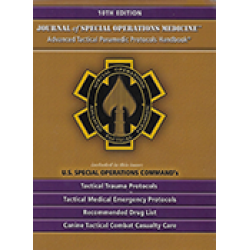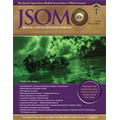Critical Hypophosphatemia in a Special Operations Combat Dive Candidate: A Case Report
Davis G, Czarnik J, Evans J, McGrane OL 23(2). 107 (Case Reports)
In contrast to shallow water (hypoxic) blackout and swimming-induced pulmonary edema (SIPE), acute electrolyte disturbance secondary to acute respiratory alkalosis is not considered a common Combat Swimmer injury but has the potential to be life-threatening. We present the case of a 28-year-old Special Operations Dive Candidate who presented to the Emergency Department after a near-drowning incident with altered mental status, generalized weakness, respiratory distress, and tetany. He was found to have severe symptomatic hypophosphatemia (1.00mg/dL) and mild hypocalcemia secondary to intentional hyperventilation between subsurface "cross-overs," causing subsequent acute respiratory alkalosis. This is a unique presentation of a common electrolyte abnormality in a highly specialized population that is self-limiting when caused by acute respiratory alkalosis but poses a significant danger to Combat Swimmers if rescue personnel are not able to respond quickly.


 Español
Español 






